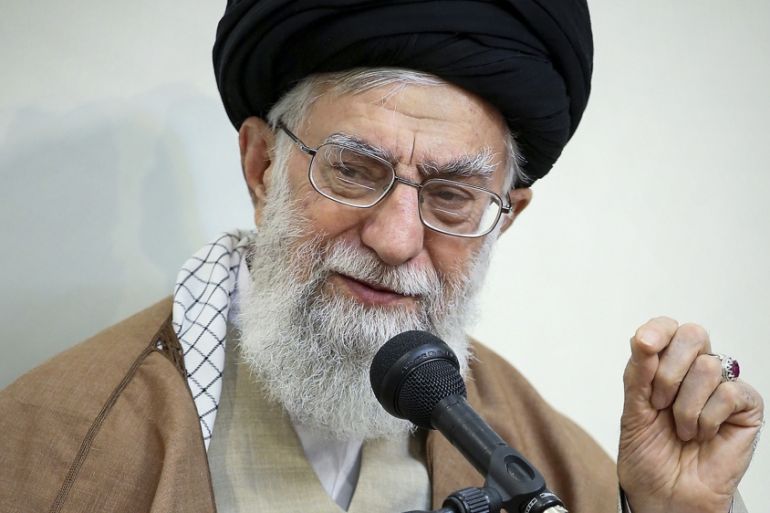Trump’s threats are empowering hardliners in Iran
Mike Pompeo’s 12 demands from Iran are giving another excuse for Iranian hardliners to come after moderates.

In a speech delivered on May 21, US Secretary of State Mike Pompeo laid out 12 demands that Iran has to fulfill in order to negotiate another nuclear deal with Washington. Pompeo’s list came just two weeks after US President Donald Trump withdrew from the Joint Comprehensive Plan of Action (JCPOA) and promised to impose new tougher sanctions on Tehran.
Feeling intensifying pressure at home, Iranian President Hassan Rouhani had to respond forcefully:
Keep reading
list of 4 itemsWho will be Iran’s next president? | Start Here
Oil slumps two percent on possible return of Iranian supply
Border security a common concern for Pakistan and Iran: Rouhani
“”Who are you to decide for Iran and the world? The world today does not accept that the United States decides for the world. Countries have their independence,” he said in a statement published on Iran’s ILNA.
This new list of demands and Washington’s increasingly hostile rhetoric will undoubtedly result in another escalation of attacks against Rouhani. US President Donald Trump’s decision to withdraw from the Joint Comprehensive Plan of Action (JCPOA) on May 8 already provoked a barrage of criticism directed at the Iranian president.
In a statement published on May 13, the head of Iran’s hardline Assembly of Experts, Ayatollah Ahmad Jannati, urged Rouhani to apologise to the nation for signing the nuclear deal. He also accused the Iranian president of crossing the red lines set by the Supreme Leader Ayatollah Ali Khamenei in his unsuccessful efforts to preserve the deal.
Jannati is probably one of the most hardline ayatollahs in Iran; he heads not only the Assembly of Experts, charged with choosing and replacing the supreme leader, but also the Guardian Council, which is responsible for vetting candidates during the elections.
Meanwhile, the conservative Kayhan newspaper, which usually voices the political attitudes of Iran’s hardliners, said in its May 14 edition that Rouhani had made numerous strategic mistakes in his decision to enter negotiations with the West. A week later, Kayhan ridiculed a statement by the centrist group, Executives of Construction, which is close to Rouhani. The spokesperson for the group, Hossein Marashi, had said the US president is eager to talk to Iran directly without the participation of the Europeans and that his offer should be considered seriously.
|
|
Kayhan claimed that it would be foolish “to believe in any new deals while they are tearing up the old” and called the attempts by the European Union to salvage the deal “a new trick”.
It is increasingly clear that Trump’s decision to withdraw the US from the JCPOA and his escalating anti-Iranian rhetoric has given the hardliners in Iran the excuse they needed to discredit Rouhani’s moderate government and pave the way for his possible removal from office.
Khamenei himself wasted no time in indirectly blaming Rouhani for the US exit from JCPOA. “Well, the honourable officials made serious efforts; they sweated profusely over it, but they failed,” he said.
The new anti-Iran team at the Trump White House may be pleased with the rising tensions in Tehran. Perhaps President Trump and his staunchly anti-Iran advisers are hoping that these confrontations between Rouhani and Iran’s powerful hardliners may eventually lead to a much desired “regime change” in the country.
Yet the US withdrawal from the JCPOA is unlikely to trigger any change in Iran that would be beneficial to Washington. If Rouhani is removed from office, he would most likely be replaced by a hardliner, a military figure perhaps from Iran’s Revolutionary Guards Corps (IRGC), who would only increase the country’s hostility towards the US and its allies.
Consequently, Trump’s misguided decision to move the US out of the JCPOA and increase pressure and sanctions on Iran could end up having disastrous consequences not only for Iran and its people, but also the already turbulent Middle East.
Judging by Iranian military’s recent statements, they could potentially wreak havoc in the Middle East, Afghanistan, and any other place where the US and its allies have interests in. Tasnim News, a news outlet close to the IRGC, has recently published articles suggesting an escalation in Yemen against Saudi Arabia and in Syria against Israel.
Iran’s judiciary has also intensified its arrests of dual-nationals in an attempt to embarrass Iranian diplomats negotiating with European countries.
Trump’s actions have also pushed Iran to further strengthen its alliances with China and Russia. In his meeting last November with the Russian President Vladimir Putin, Khamenei called for unity over sanctions imposed on both Russia and Iran. “We can nullify US sanctions, using methods such as eliminating the dollar and replacing it with national currencies in transactions between two or more parties; thus, isolate the Americans,” the supreme leader said.
Trump repeatedly tried to drive a wedge between Iran and Russia. Israeli Prime Minister Benjamin Netanyahu’s visit to Moscow earlier this month on the occasion of Russian Victory Day was the last in a series of attempts in that direction. Putin, however, has so far shown no indication that it is ready to abandon Iran to please the US or Israel.
Whatever Trump may eventually decide to do, he should not claim to do it in the name of “the long-suffering people of Iran”. A bad decision such as imposing even tougher sanctions on Iran, an attempt at regime change, or a military strike of any sort would push the country towards a military theocracy far more repressive and uncompromising than before both at home and abroad .
The views expressed in this article are the author’s own and do not necessarily reflect Al Jazeera’s editorial stance.
